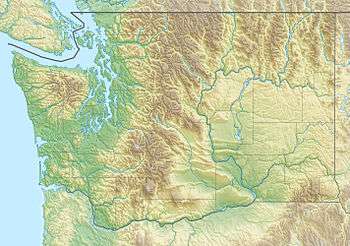Osceola Peak
Osceola Peak is an 8,587-foot (2,617-metre) mountain summit located in western Okanogan County in Washington state. The mountain's name was officially adopted in 1972.[4] Osceola is the 10th highest peak of the Okanogan Range, which is a sub-range of the North Cascades.[5] Osceola Peak ranks 50th on Washington's highest 100 peaks, and 48th on the "Bulger List".[1] The mountain is situated in the Pasayten Wilderness, on land managed by Okanogan National Forest. The nearest higher peak is Mount Carru, 1 mile (1.6 km) to the east.[1] The mountain has a steep north face, but the south slope is covered in scree which allows a nontechnical climbing ascent. Precipitation runoff from Osceola Peak drains north into tributaries of the Similkameen River, or south into Eureka Creek, which is part of the Methow River drainage basin.
| Osceola Peak | |
|---|---|
 Osceola Peak Location of Osceola Peak in Washington  Osceola Peak Osceola Peak (the United States) | |
| Highest point | |
| Elevation | 8,587 ft (2,617 m) [1] |
| Prominence | 1,147 ft (350 m) [1] |
| Listing | List of Highest Mountain Peaks in Washington 35th |
| Coordinates | 48°49′51″N 120°34′36″W |
| Geography | |
| Location |
|
| Parent range | Okanogan Range North Cascades Cascade Range |
| Topo map | USGS Mount Lago |
| Climbing | |
| First ascent | 1933 by Hermann Ulrichs and Richard Alt[2] |
| Easiest route | class 2 Scrambling [3] south slope |
Climate
Most weather fronts originate in the Pacific Ocean, and travel northeast toward the Cascade Mountains. As fronts approach the North Cascades, they are forced upward by the peaks of the Cascade Range, causing them to drop their moisture in the form of rain or snowfall onto the Cascades (Orographic lift). As a result, the west side of the North Cascades experiences high precipitation, especially during the winter months in the form of snowfall. During winter months, weather is usually cloudy, but, due to high pressure systems over the Pacific Ocean that intensify during summer months, there is often little or no cloud cover during the summer.[6]
Geology
The North Cascades feature some of the most rugged topography in the Cascade Range with craggy peaks, spires, ridges, and deep glacial valleys. Geological events occurring many years ago created the diverse topography and drastic elevation changes over the Cascade Range leading to various climate differences.
The history of the formation of the Cascade Mountains dates back millions of years ago to the late Eocene Epoch.[7] With the North American Plate overriding the Pacific Plate, episodes of volcanic igneous activity persisted.[7] In addition, small fragments of the oceanic and continental lithosphere called terranes created the North Cascades about 50 million years ago.[7]
During the Pleistocene period dating back over two million years ago, glaciation advancing and retreating repeatedly scoured the landscape leaving deposits of rock debris.[7] The "U"-shaped cross section of the river valleys are a result of recent glaciation. Uplift and faulting in combination with glaciation have been the dominant processes which have created the tall peaks and deep valleys of the North Cascades area.
References
- "Osceola Peak, Washington". Peakbagger.com.
- "Osceola Peak". Bivouac.com. Retrieved 2019-12-20.
- "Osceola Peak - 8,587' Washington". listsofjohn.com. Retrieved 2019-12-21.
- "Osceola Peak". Geographic Names Information System. United States Geological Survey. Retrieved 2019-12-20.
- "Okanogan Range". Peakbagger.com. Retrieved 2019-12-21.
- Beckey, Fred W. Cascade Alpine Guide, Climbing and High Routes. Seattle, WA: Mountaineers Books, 2008.
- Kruckeberg, Arthur (1991). The Natural History of Puget Sound Country. University of Washington Press.
External links
- PBase photo: Osceola Peak's north face
- PBase photo: Osceola Peak's southeast face